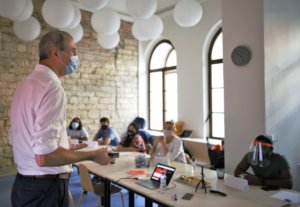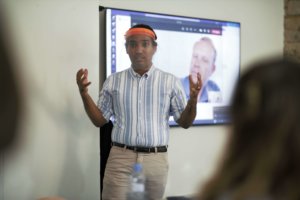Stay in the loop! Subscribe to our mailing list

Last week, the Czech National Agency for International Education (DZS) organized a workshop to give a boost to presentation and rhetorical skills of Media Ambassadors of the Study in the Czech Republic initiative. There international university students are not just the faces of the programme, they are active on social media, and attend conferences and seminars, giving speeches about their experiences living and studying in the Czech Republic. The all-day-long course in Prague was led by coaches who also help participants of the renowned TED Talks prepare for their speeches.
 Nine young students from all over the world gathered at the DZS headquarters in Prague. They have all chosen to study in the Czech Republic and their presentations about the life in Czech university towns are extremely inspiring to other students from abroad who aspire to come study in Czechia. It is not however enough just to have an interesting presentation topic, stressed David Svoboda, the experienced couch who led the workshop along with his colleague Martin Vasquez. "Practically all speakers make the typical mistake of trying to fit way too much information in, both verbally and visually. If someone asks me during the conference coffee break what the last presentation was all about and I’m not able to give them an answer, something has gone wrong,” said Svoboda, describing one of the biggest public speaking errors that leads to the audience quickly losing interest. The old saying “less is more” applies double here.
Nine young students from all over the world gathered at the DZS headquarters in Prague. They have all chosen to study in the Czech Republic and their presentations about the life in Czech university towns are extremely inspiring to other students from abroad who aspire to come study in Czechia. It is not however enough just to have an interesting presentation topic, stressed David Svoboda, the experienced couch who led the workshop along with his colleague Martin Vasquez. "Practically all speakers make the typical mistake of trying to fit way too much information in, both verbally and visually. If someone asks me during the conference coffee break what the last presentation was all about and I’m not able to give them an answer, something has gone wrong,” said Svoboda, describing one of the biggest public speaking errors that leads to the audience quickly losing interest. The old saying “less is more” applies double here.
The morning agenda was focused on the art of capturing and keeping the attention of the audience. The students learnt about “the jaw dropping moment", “storytelling”, and the “aha moment”, the very same techniques the couches use to prepare speakers for the famous TEDx Prague conference. The international students then tried their hand at several exercises mostly known in the business world, attempting to sell seemingly impossible or nonsensical things. Their tasks involved selling a microwave to a Neandertal and presenting the advantages of mobile phones to Romeo and Juliet. The couches chose those humorous activities as a way into prodding their “salespeople” to better their verbal creativity and the art of persuasion.
The importance of choosing an attractive way of relaying your message became clear to Ahmed Salem, a student from Yemen currently enrolled in the Laboratory Assistant study programme in Pardubice. “I found out my presentations aren’t as good as they deserve to be. I often present the outcomes of my research at school and sometimes I feel like I can’t really capture the audience’s attention well enough,” Salem told us during the lunch break.
In the afternoon, the time had come to put their newly acquired knowledge to the test. Everyone chose a topic and prepared and gave a presentation. They had five minutes available to them. Remaining students and both coaches then provided constructive criticism. Vitally, the speakers got a chance to incorporate the feedback, learn from their mistakes, make some changes, and give their speech another shot. Everyone’s performance was miles better on their second try. The presentations were filmed, and so every participant left the workshop with a recording of their speech to analyse and learn from.
Public speaking skills open the door to new opportunities whether you are studying or working, said Katarina Larina, a workshop participant and a student from the Ukraine, enrolled on the Czech Language Preparatory Course of the University of the West Bohemia in Pilsen, in an apt summary. “If you’re a good public speaker, you will find your place in life. Being able to talk about yourself in an interesting way will not only aid your career, it will help you achieve anything you dream of.”